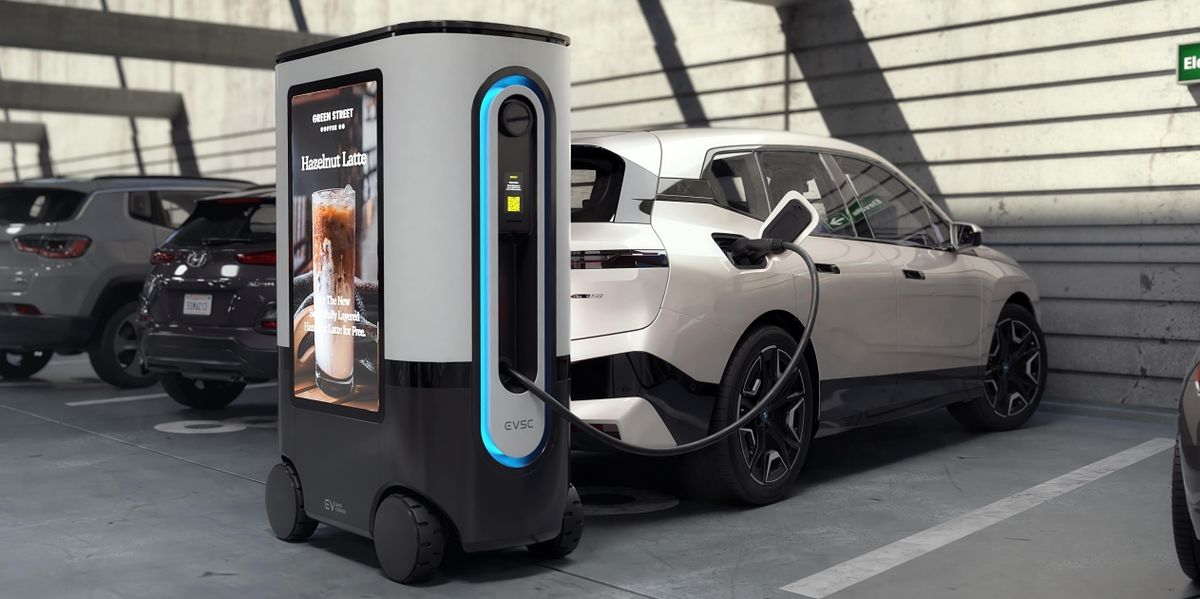Best Way to Charge an Electric Car May Soon Be a Robot Named Ziggy

Ziggy is a robotic EV charging station that’s designed to live in parking areas, where drivers can summon it through an app to come charge their vehicle.Charging startup EV Safe Charge has been developing the robots since 2019 and aims to have Ziggys shipped by 2024.Roughly the size of a refrigerator, Ziggy is a battery on wheels that will be able to autonomously navigate parking areas to reserve drivers’ spots and charge their cars. And of course, it’s got ads on it.
If you’ve driven an electric vehicle, you know the struggle of arriving at a parking lot only to find the sparse EV charging spots all filled up. Worse yet, one of the cars hooked up to the charging port is fully charged with no owner in sight! Oh, the horror of underdeveloped EV infrastructure. A Los Angeles startup named EV Safe Charge thinks it has a solution: Ziggy, the EV-charging robot.
Ziggy is intended to be a solution for parking areas looking to implement EV charging but struggling to overcome the limitations of stationary charging systems. The way it works is this: Drivers enter the parking area and reserve a numbered parking spot through an app. When they arrive at their spot, Ziggy is there, ready to charge their car.
EV Safe Charge
The robot is essentially a refrigerator-sized battery with four independently driven wheels and cameras on all sides, allowing it to autonomously navigate from its home base to parking spaces at speeds slower than a walking pace. Though it can’t plug in and unplug your car for you, the usage cost of Ziggy can be based on time to discourage people from monopolizing the robots. Alternatively, parking areas can provide Ziggy’s services for free. It also has two screens with optional touchscreen capacity on the long sides that can display advertisements or parking structure maps.
This content is imported from YouTube. You may be able to find the same content in another format, or you may be able to find more information, at their web site.
Parking areas will be able to lease Ziggys, so maintenance is taken care of by EV Safe Charge, and fleets of the robots can be deployed temporarily for events. While a Ziggy charging station will need to be installed, the system is supposed to eliminate some of the hassle of stationary chargers for both drivers and property owners.
Production to Start in 2024
EV Safe Charge began developing Ziggy in 2019, working with San Francisco design firm Box Clever to make Ziggy welcoming and intuitive, factors that are important for the integration of autonomous robots into human spaces. The company hopes to start shipping the mobile charging systems by 2024 after starting production in 2023, and it has recently begun taking reservations for Ziggys.
It seems like a great idea: EV Safe Charge advertises Ziggy as immediately deployable and easily scalable, things EV charging systems haven’t yet become, really. Anyway, robots are already serving your food at IHOP and fetching packages at warehouses. Deploying to charge your EV at your chosen spot in a parking garage is just another way robots can be helpful.
However, there are still some questions surrounding the system. Will some poor Ziggy fall victim to distracted driving? In a tight, one-way parking garage, will drivers get stuck behind the slow rollers? How many Ziggys does a parking area need to meet demand, and how much will the service cost relative to stationary chargers? There’s plenty of time to figure out the answers to those questions, though, so for now, think of Ziggy as a window into some of the unexpected ways EVs will shape the future.
This content is imported from {embed-name}. You may be able to find the same content in another format, or you may be able to find more information, at their web site.
This content is created and maintained by a third party, and imported onto this page to help users provide their email addresses. You may be able to find more information about this and similar content at piano.io



